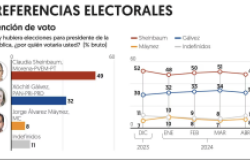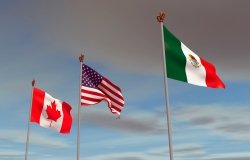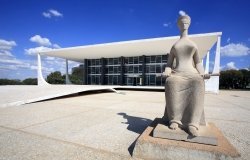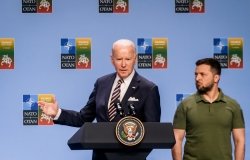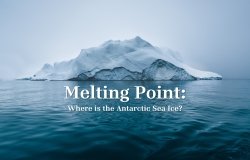The Role of Transnational Universities in a World with Transnational Challenges
Technological, economic, and political changes over the past 25 years have altered the structure of many of the world's challenges. In this Director's Forum, Jeffrey S. Lehman, president of Cornell University, will discuss three of those challenges: the challenge of life in the age of the genome, the challenge of wisdom in the age of digital information; and the challenge of sustainability in the age of development. This video of this event is available here.
Overview
The following is the speech, as delivered, by Jeffrey Lehman.
Thank you for inviting me to present a Director's Forum here at the Woodrow Wilson International Center for Scholars. For those of us who have lived on the academic side of policy analysis, the Center has long been a vital location, bringing together people who are serious about important long-range questions of public policy. I am delighted to be able to speak with you this morning about the role that great universities should play in a world that was radically re-fashioned at the end of the twentieth century.
I plan to approach this topic in 3 stages.
First, I will give you some background on Cornell University. Cornell is a unique, even idiosyncratic leader in the world of great research universities, and its distinctive history has strongly influenced my own thinking about the role of universities in human society.
Second, I will talk about three challenges that confront our species today, presenting us not only with significant dangers but also extraordinary hopes. The critical point is that, in each instance, the challenges are transnational. The strong interdependence that characterizes human life today means that it is unlikely that some people, cultures, or nations reap the upside while others reap the downside. Our lots are intertwined, and we will all move up or down together.
Third, I will make some normative claims about how great universities should behave in the face of these challenges. I am claiming a particular role for our institutions within twenty-first century society, a role that other institutions are not as well positioned to play. And I am claiming that the proper fulfillment of that role will require the intelligent and willing collaboration of many elements in our society, beginning with the universities themselves.
So let me begin by talking about Cornell.
The historian Frederick Rudolph described Cornell as "the first American university" because it was so different from what had come before. The youngest Ivy League institution, Cornell was founded in 1865, in the aftermath of Civil War and Industrial Revolution. Ezra Cornell was an inventor, a farmer, and a businessman, committed to developing a new kind of university that could unite seriousness of intellectual purpose with responsiveness to society's practical needs. He worked with the government of New York State and the federal government to establish a privately endowed university that would also be New York's land grant university. It would train leaders for the industrial classes as well as the professional classes. The founders believed in a university that would enhance our understanding of pig breeding at the same time that it enhanced our understanding of Euripides.
Cornell's founders were radical in their belief that the new university should provide instruction for young men and women of all races and religions and nationalities, in all subjects, both theoretical and practical. In Ezra Cornell's words, the goal was to found an institution where any person can find instruction in any study.
But notwithstanding their decision to locate the university on Ezra Cornell's farm, high on a hill in the beautiful Finger Lakes region of upstate New York, they were not seeking to separate it from the world. Social engagement was primary. The path to autonomy would not be by renunciation of contact with the potential corruptions of the outside world.
Nor would the needs of the larger society be defined in purely national terms. National interests have of course played an important role in the development of this university's activities – from our original land grant ideals up through Sputnik and our faculty and students' leadership of the Mars rover expedition. But Cornell's first president, Andrew Dickson White, was a cosmopolitan man who had lived and studied abroad, and from the beginning our university sought students and faculty from outside as well as within the United States. Early prominent faculty members such as Goldwyn Smith were avowed internationalists. And as early as 1925 we were dispatching faculty members to Nanking to help develop a plant breeding and improvement program for China.
When I look at Cornell today, I see an institution whose character is still shaped by four legacies of its founding:
- Inclusiveness. From the beginning, Cornell welcomed the offspring of farmers and doctors together. To this day Cornell has the most Pell Grant recipients of any Ivy League university.
- Intense partnership with the public sector. While Cornell is a private institution, we also administer colleges of agriculture and life sciences, veterinary medicine, human ecology, and industrial and labor relations with New York's SUNY system and we run the state's extension service.
- A transnational profile. Cornell is the only American university to operate a medical school outside the United States (in Doha, Qatar), and we are committed to strong partnerships with peers worldwide. But I'll have more to say about that in a moment.
- Breadth of excellence. Cornell is renowned for its leadership in an extraordinary range of fields, from nanotechnology to rice to literary theory to architecture to veterinary medicine to computer science to East Asian languages to the hospitality industry. We take seriously Ezra Cornell's suggestion that his dream was to found an institution where any person can find instruction in any study. And Cornell seems to have been able to sustain across large swaths of our university a remarkably healthy culture of mutually supportive, interdisciplinary and multidisciplinary collaboration.
So how should a university like Cornell interpret the world that surrounds us? In a world that seems to be ever more dominated by science and technology, I believe that we should recognize the need to inform our approach to critical scientific and technological challenges with the full range of disciplines that we have at our disposal – the humanities and the social sciences in full partnership with the natural sciences and technological disciplines.
I would like you to consider for a few minutes three powerful challenges that face humanity today. Each of these challenges speaks to us across the full range of intellectual disciplines. Each poses difficult scientific and technical challenges. At the same time, each also presents societal dilemmas that call for careful analysis by social scientists. And ultimately, each raises profound questions about the human condition that lend themselves to reflection through the characteristic methods of the humanities.
A first great challenge concerns life in the age of the genome. At the level of science, our new appreciation for the universal vocabulary of DNA has fused traditional biological research across plant and animal species with research in chemistry, computer science, engineering, medicine and physics. The handful of institutions that have strength in all these fields have the potential to produce breakthrough understandings. Understandings that could prevent famines and could tame the world's most virulent diseases.
But this same revolution also calls for insights from the humanities and the social sciences -- to help us answer a new set of questions about our place in the universe, our relation to other species, and our relationships to one another. It is conceivable that we might contribute to the extension of the typical human lifespan to 100 years or more; we would do well to contribute to a deepened understanding of the significance of such an achievement at the level of the individual and at the level of societies of individuals.
A second great challenge concerns wisdom in an age of digital information. No aspect of human activity, individual or collective, has been immune to the transformative power of computing and information science. These technological developments open up the full range of possibilities for our future, from utopian to dystopian. Every text in every library of the world could become freely available to anyone with a computer. And every detail of our personal lives could become freely available to our neighbors. Any scientist in the world might obtain free access to digital information about every species of life on the planet. And any terrorist might obtain free access to digital information about the weakest links in our societal infrastructure.
We have a special duty to contribute to progress in this domain. I believe we also have special duties to participate in allied projects. Like helping people to transform ubiquitous and cheap information into human-centered wisdom. And like exploring what it means to have so completely structured our lives in symbiosis with complex electronic machines.
A third great challenge concerns sustainability in the age of global development. Today almost every domain of human economic and political activity presents one or another sustainability problem. We may worry about our dependence on resources that will be exhausted, or about the damage that technological processes inflict on our ecosystem, or about the fragility of certain social or political structures that underlie our economy. In each case, we are looking for a new, substitute approach that holds the promise of a longer time horizon of sustainability, we are looking for a minimally disruptive way to make a transition to that new approach, and we are looking for a mechanism to insure that the new approach is economically viable.
It is important to recognize that none of these challenges involves a matter that is confined to a single country. Whether we are thinking about the AIDS virus or a computer virus, about data pollution or water pollution, about transgenic papayas or liquid natural gas supplies, human beings everywhere are truly interdependent. And it is therefore consistent with a desire to make contributions on those challenges (although not dependent on that desire) that we should self-consciously understand ourselves as transnational institutions.
When I use the term, "transnational institution," I am evoking the notion of transcending but not abandoning national identity, viewing the world from a perspective that stands outside our country without feeling a need to pledge allegiance to some new global substitute for the nation-state.
Cornell is, to me, an outstanding example of a transnational institution. Cornell's identity has always been bound up with America, without ever having been bound down. As the land grant university of New York State, Cornell is rooted in American soil. Yet those roots have never implied parochialism. In the same way New York has long embraced the open spirit of Emma Lazarus's words on the Statue of Liberty, Cornell has always welcomed students and ideas from the world over.
A modern transnational university has two essential attributes. First, it takes a particular moral stance in the education of its students, nurturing within them a transnational perspective on the human condition.
Why might one be interested in other countries, their people, their societies? One reason is certainly comparativist. We believe, rightly, that we will gain new insight into ourselves and our own society by better understanding how other societies and cultures have taken different paths to resolve similar social questions.
Yet I think an even more significant reason is fundamentally humanist. Even while we respect the importance of national borders, a core part of us subscribes to a community that includes all human beings. We are affirmed whenever we recognize ourselves in people from different cultures. We are ennobled when we appreciate that people everywhere share a joint responsibility to care for the planet we all inhabit.
Despite the persistence of misunderstanding and conflict, I believe that we are witnessing the evolutionary development of a truly transnational pluralistic culture – a culture that includes profoundly important universal aspirations while retaining equally important regional, national, and local variation. And great universities should prepare their students to prosper in such a culture by holding a transnational perspective on the human condition.
What does such a perspective entail? In its essence, a transnational perspective must be open and engaged. Open to new ideas, new ways of thinking, new ways of feeling. A transnational perspective must recognize the world's radically varied texture without rushing to presume some variants superior and others inferior. A transnational perspective is different from a global perspective because it transcends nationalism without insisting on a unitary global substitute. It embodies a vision of universalism that reinforces and is reinforced by pluralism.
Such a vision entails much more than a detached acceptance of alternative perspectives, however. A transnational perspective implies a willingness to engage. To participate in the efforts of people everywhere to better understand the world and to improve the conditions of their lives. To advocate for certain humanist values, even while listening carefully and respectfully to those who might reject those values.
To nurture such a perspective in our students, we must first construct our campuses as diverse communities. And we must then press our students to live actively integrated lives within those communities.
Constructing our campuses as diverse communities means recruiting and enrolling students from around the world. It means developing faculties that study the histories, cultures, politics, and economies of every part of the world. It means ensuring that our curricula are rich with offerings about foreign languages and cultures as well as the many languages and cultures that are found within our own particular nations.
But it is not enough simply to construct our campuses as diverse communities. The natural wariness of people means that we must actively press our students to take advantage of all aspects of our communities' diversity, encourage them to reach out across boundaries to meet one another, challenge them to see the world through the eyes of others. We must sustain environments in which their daily lives are characterized by a constant ebb and flow between people like themselves and people who are different.
That is the kind of environment in which students develop what the poet John Keats called "negative capability" – the ability to hold two opposing perspectives in one's mind at the same time without rushing to declare one right and the other wrong. Consider, for example, a recent survey of Americans by Cornell's survey research institute. It found that whereas in the Islamic world 5% of respondents considered America "friendly" and 67% "ruthless," in our own country 66% of respondents would describe America as friendly and only 29% ruthless. The goal is not to declare one set of respondents right and the other wrong; leaders in this century must learn to recognize the importance of the difference in perspective itself. They must learn how to explore where that difference came from, and how it might be reduced over time.
A modern transnational university is characterized by more than just a particular orientation to the preparation of students. In its role as a research institution, a transnational university acts to further the development of a true worldwide community of researchers.
Notwithstanding the existence of discipline-based peer review, conferences, journals and research teams, we still have work to do if we are to realize this goal. Linguistic subcommunities still largely define research subcommunities. And those subcommunities are themselves often further subdivided, often as a result of geographic distance.
Universities must recognize the tremendous wasted potential associated with that separation. We are more than just aggregations of individual faculty members who participate in distinct fields that have experienced varying degrees of internationalization. We have our own collective identities, we attract resources to the collectivity, and we champion values and goals for the community.
I believe that we should understand ourselves today as nodes on a global research network, a network whose communication properties are changing. We should accept our shared responsibility for that network, and for the manner in which its communication properties evolved. If you will indulge me the right to extend the metaphor just one more step, we should work together to increase the bandwidth on our network.
What might that entail? First and foremost, it would entail finding and committing the resources to move people – students and teachers – from node to node on the network.
This work calls for opportunism. It recognizes that some movements of people can be presented as promoting a particular project that would attract support from a singular nation's government. Other movements of people might be funded by pooling grants from more than one country. Still others might appeal to the philanthropic impulses of private citizens. However it is funded, the frequent movement of people from node to node is essential if we are to establish a system in which individuals and ideas move freely, sustaining a true transnational academic culture.
Last month I was in China, signing agreements that will establish two new programs that will move students and faculty between Ithaca and Beijing. In one agreement, Cornell and Tsinghua University will be using internal funds to cover the costs of moving a small number of faculty back and forth. In a second, we will be relying on private philanthropy to cover the costs of moving students from Ithaca to Beijing.
The project of establishing universities as transnational institutions is of more than theoretical interest. An enormous amount is riding on it.
Our students will graduate into a world whose challenges are transnational. This morning I have described three challenges that fuse our need for humanistic, social scientific, scientific, and technical understanding. I could just as easily have focused on political or social challenges like the ones that Kofi Annan last week described as "interconnected threats." The time is past when countries could isolate themselves, when they could shield themselves from the consequences of actions taken elsewhere on Earth. Everywhere one looks, one sees issues that by their nature require responses which are coordinated and cooperative.
And here I would like to suggest that America's great research universities have a special, perhaps even unique, ability to lay the groundwork for coordination and cooperation. Our essential missions include research that values truth over ideology, teaching that prepares students for lives of contribution and meaning, and service to a broad conception of humanity. I would submit that as long as we are true to those missions (and, parenthetically, as long as we don't try to become amateur diplomats or mediators) we are welcomed throughout the world with less suspicion than profit motivated entities, governmental bodies, or even many more ideologically focused NGOs. As long as we recognize the creation of cross-border good will as an important byproduct of our activities and not the primary product, we may ironically be able to create more of that byproduct than entities for whom its creation is the central mission.
Let me provide a couple of Cornell-related examples. During the 1950s and 1960s, events in both China and the U.S. meant that our universities lost some of their ability to train young people who are deeply sophisticated about China. Recognizing how intolerable that state of affairs is, one of our graduates, Mike Zak, is underwriting the launch of a new undergraduate major in our college of Arts and Sciences. Called China and Asia Pacific Studies, this major requires students first to become fluent in Mandarin through our language immersion program, then to take a set of core courses on campus, then to spend a semester here in Washington at our Cornell in Washington program, and then to spend a semester at Peking University studying with top faculty members from Beida. The students who participate in this program are likely themselves to come from all over the world. They will emerge with deep expertise about what will surely be the most important bilateral national relationship this century. Even as political relations between the U.S. and China waxed and waned and waxed again, the establishment of this program proceeded on an even keel.
Or consider the Bridging the Rift project. Last March I stood on the border between Jordan and Israel, participating in a ceremony that laid the cornerstone of a new Center. Each country is contributing 75 acres of land to establish a new 150-acre zone to support the Center. Graduate students from both countries will come to Cornell and to Stanford to receive advanced training in the life sciences. They will then return to the Center to work together under the supervision of scientists from both universities to create a prototype for something that is being called The Library of Life. That evening, after the groundbreaking ceremony, King Abdullah spoke about how projects like these can help us all to raise our sights, remind us of our shared destiny, and contribute to the movement from what he termed a "cold peace" between those countries to what he termed a "warm peace."
Of course, transnational universities cannot do our work effectively without help from others. We need to be able to bring together on our campuses the finest students and faculty members from around the world. That means that their home countries must be willing to let them leave, and our own country must be willing to let them in.
We need to maintain on our campuses a culture sometimes referred to as academic freedom, but more precisely described in the 1940s by Cornell historian Carl Becker as freedom united with responsibility – freedom to do what one chooses, responsibility for what one chooses to do. For that we are dependent upon our own country's ongoing commitment to First Amendment values, a belief in the essential need for institutions where unorthodox, bizarre, and even hateful ideas are accepted with civility and made the object of critical inquiry and discussion.
We need to be able to pursue truth and understanding in areas of basic science that require the use of enormously expensive equipment. For that we are dependent upon the willingness of our government, our corporations, and our philanthropists to make ongoing investments in the deep infrastructure of future discoveries. They must remain willing to commit to the building of new intellectual roadways, long before anyone can know where those roadways will lead, and certain that some of those roadways will turn out to be dead ends. We do not know today what engineering superstructure will produce commercially viable fuel cells in the future; yet we can say with absolute confidence that whatever superstructure emerges will rest on the foundation of decades-long research in advanced materials science.
The daily newspaper surely contains reasons for anxiety. From visa policy to political litmus tests to weakened support for Pell grants to a cut in the National Science Foundation budget, there are reasons to wonder whether our country remains committed to the principles that made American higher education preeminent in the world, an engine of economic growth domestically and an engine of democratic enlightenment values worldwide.
And yet we also have reason for cautious optimism. Our country has a history of stepping forward and recognizing when the times call for a renewed appreciation for what universities can accomplish. In the nineteenth century, Vermont's Senator Justin Morrill saw the need for a new kind of institution and his vision contributed to the birth of Cornell. In the twentieth century, the challenge of Sputnik prompted the commitment to basic scientific research that fueled technological, economic, and ultimately political progress over the past fifty years.
In the twenty-first century, will America's leaders recognize our national interest in the continued preeminence of America's transnational universities? I think so. Our continued influence in global affairs will be much stronger if the next generation of the world's political and economic leaders spend their formative years studying on American rather than British and Australian campuses. Our continued ability to lead in response to global challenges will be much stronger if the next generation of transformative fundamental discoveries are led by the partnership of American universities, government, businesses, and philanthropists.
But we cannot take for granted the proposition that these facts will drive our public policy. Leaders in all sectors of our society will need to take the long view. They will need broad encouragement to reflect on fundamental issues of public policy. The world of policy must be united with the world of ideas.
Of course, that has been the mission of the Woodrow Wilson Center for almost four decades. And for that reason it has been a special honor for me to have had the opportunity to speak with you this morning.
Thank you for your interest in this event. Please send any feedback or questions to our Events staff.
